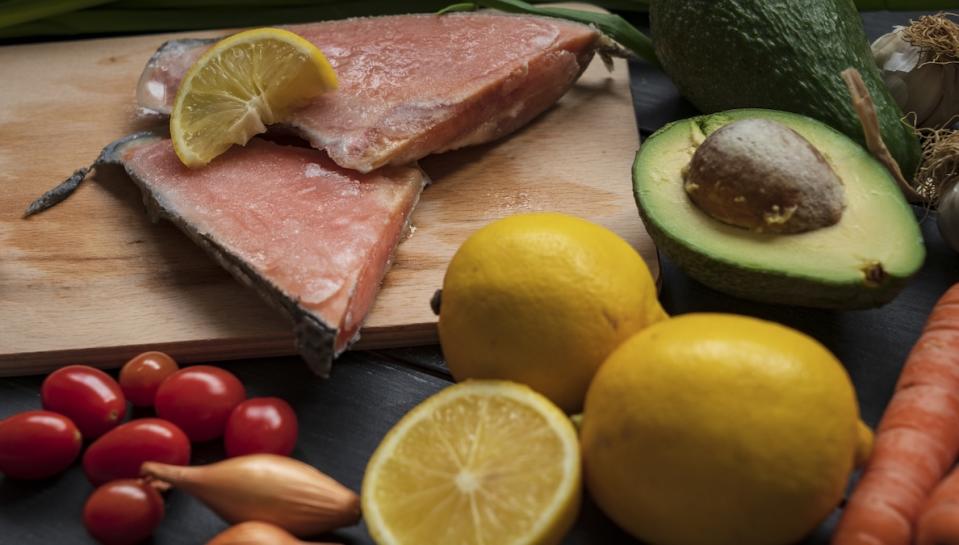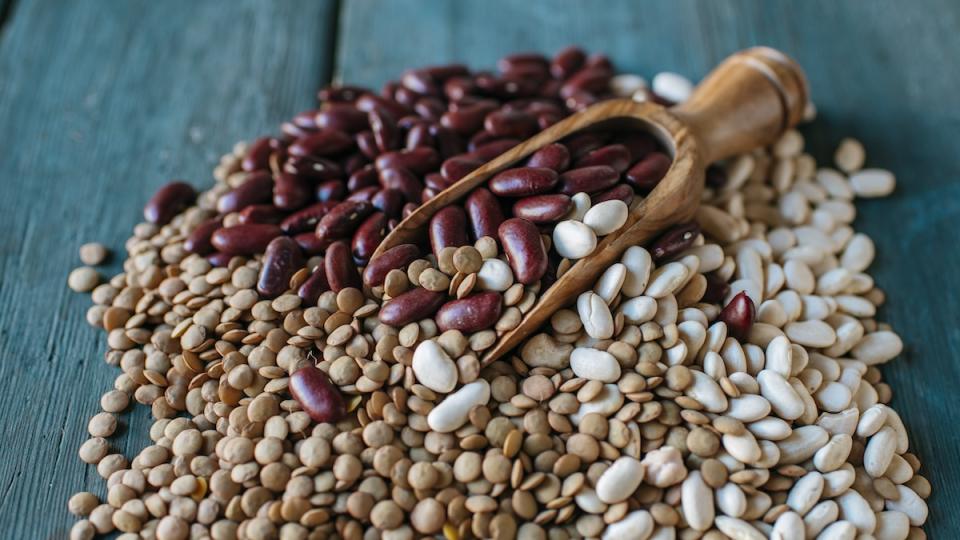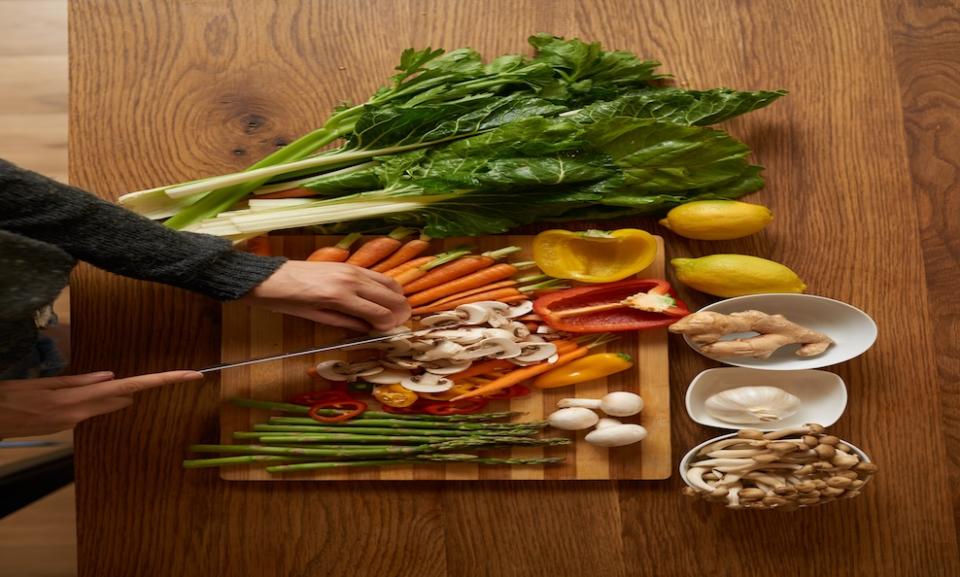Paleo vs. Mediterranean Diet: Colorful Foods with Varying Flexibilities
If there’s one thing the cavemen of the Stone Age and some of the healthiest, longest living populations in the contemporary Mediterranean have in common, it’s their high intake of whole, Earth-derived foods. While the notorious Paleo diet shares a few commonalities with the much more beloved Mediterranean diet, there are significant distinctions between the two.
The Diets Prioritize Whole, Unprocessed Foods
You won't find any extreme calorie counting or restrictive intermittent fasting routines between Paleo vs. Mediterranean diets. Rather, these two consist of unprocessed, high-protein and fiber foods that can help reduce cholesterol levels, and improve blood pressure and cardiovascular health, among many more benefits. Mary Albus, RDN, LDN, from Gainful Nutrition tells Women's World, "The idea is that eating in this manner aligns with what the human body is intended to consume from the earth, rather than today’s ultra-processed, Western diet, which has been associated with modern chronic metabolic disease."
Paleo vs. Mediterranean Diets Compared
The Paleo Diet is (Sort Of) Based on What Cavemen Ate

Elena Yeryomenko
The main idea of this diet is to follow the eating patterns of early humans during the Paleolithic era, back before farming and industrialization was introduced to the world. In other words, if the food can't be hunted or gathered, it's probably not part of the diet. According to Toby Amidor, MS, RD, CDN, it "involves mimicking the same eating habits as the hunter-gatherers and promotes consuming fruits, vegetables, nuts, seeds, healthful oils (like walnut, olive, coconut, and avocado), meat, fish, shellfish, poultry, and eggs in hopes of leading to a more healthy and disease-free life.”
The Mayo Clinic and The Paleo Diet website detail some of the specifics of these guidelines:
When it comes to meat selections, go for grass-fed and lean cuts.
Optimal fish choices include salmon, mackerel and albacore tuna, which are high in omega-3 fatty acids.
As for poultry and eggs, free-range is preferred.
Leafy green vegetables are encouraged, as well as root veggies (sweet potatoes, cassava).
Paleo Restricts Some Key Food Groups
Perhaps the most controversial factor of the Paleo diet is the extent to which it excludes certain food groups: "It prohibits eating grains, dairy, legumes, potatoes, refined sugar, and refined vegetable oils, because proponents claim these foods appeared only after the agricultural revolution and are associated with inflammation and therefore many chronic conditions including heart disease, cancer, and diabetes,” says Toby Amidor, MS, RD, CDN.
Yup, this means no bread (of any kind), rice, oatmeal, cheese, alcohol or even adding salt to season your meals. Natural sweeteners such as honey and maple syrup are also prohibited.
All processed foods are entirely avoided - think cereal, yogurt, chips, cookies, soups, frozen foods, etc. At it’s simplest, if you can’t picture a caveman eating it, then it does not fit within the Paleo diet.
- Mary Albus, RDN, LDN

Natalia Gdovskaia
Proponents Claim Paleo's Benefits Are Plentiful
Avid proponents of the Paleo diet share some of its potential benefits, including better sleep, clearer skin, greater mental clarity, a stronger immune system and more energy. There have also been numerous discussions and research surrounding the diet's abilities to lower blood pressure and cholesterol, and to boost overall cardiovascular health.
For example, a 2021 research study from the journal Nutrients examined individuals with type 2 diabetes following a Paleo diet and found that results were "associated with lower fat mass, BMI, waist circumference, systolic blood pressure, and serum triglycerides." While the diet's emphasis on whole foods "provide us with an abundance of beneficial nutrients without containing added sugars, fats, and sodium, which can reduce risk for heart disease, high cholesterol, diabetes, and obesity," as Albus says, there isn't quite enough flexibility or variety to deem it a sustainable lifestyle.
Paleo is Popular for Weight Loss
Of course, cutting out processed foods like packaged snacks (chips, cookies, candy) and added sugars will reduce calorie intake, leading to weight loss. And the Paleo diet's high-protein, low-carb eating routine helps to keep you feel satiated for a long time.
Related: Keto vs. Paleo: Meat Heavy Diets, With Major Differences
The Paleo Diet is Too Restrictive for Nutritionists to Recommend
While the diet does include nutrient-dense whole foods, its complete exclusion of important food groups is cause for caution. Grains, legumes and dairy provide essential nutrients. Low fiber seems to be a common issue that arises when cutting out grains from your diet. Further, the lack of dairy means low calcium and vitamin D, which affects bone density and puts one at risk for osteoporosis and bone fractures.
Amidor warns that, "It is tough to follow as it avoids numerous food groups including dairy, ALL added sugars, and grains including flours." She adds, "Other cons of the Paleo diet is that it is tough to follow while traveling, dining out or socializing. Further, much of the scientific jargon used is controversial including many of the diets health claims and the reason for the elimination of the entire grain and dairy group." As always, a balanced diet that includes all food groups — in moderation — is the most optimal for overall health.
Any diet that eliminates an entire food group isn’t ideal from a nutrition standpoint. A strict paleo diet does not allow for dairy products, legumes, or whole grains, all of which are highly nutritious, and when eliminated, can lead to nutrient deficiencies, especially in things like fiber, vitamin D, calcium, B vitamins, zinc and magnesium.
- Mary Albus, RDN, LDN
The Mediterranean Diet is Associated with a Longer Lifespan

ediebloom
Similar to Paleo, the Mediterranean diet is a much-discussed and commonly followed diet. It has been praised for its research-backed benefits, including improved cardiovascular health and an extended life expectancy.
Mediterranean Includes a Greater Variety of Foods than Paleo
The Mediterranean diet also consists of whole, unprocessed foods, but does not eliminate entire food groups as the Paleo diet does. Mary Albus, RDN, LDN tells us, "It is much less strict with no concrete rules, and suggests emphasizing certain foods over others."
Dairy and meat are allowed, in moderate portions. And grains are certainly not discouraged either — the diet includes whole grains (brown rice, whole-wheat bread, quinoa) which are integral sources of fiber for your digestive system. Toby Amidor, MS, RD, CDN, also explains that, "Meats are recommended in smaller amounts but research has shown that eating lean beef as part of the Mediterranean diet can help reduce total cholesterol and LDL cholesterol."
Some staples of the Mediterranean diet include:
Legumes — chickpeas, lentils, alfalfa, kidney beans and more
Nuts and seeds
Omega-3 rich fish — salmon, sardines, tuna
Leafy green vegetables
Fresh fruits
Healthy fats — olive oil, avocados

F.J. Jimenez
Legumes Are at the Core of this Heart-Healthy Diet
Perhaps the biggest difference is the Mediterranean diet's emphasis on legumes. Not only are legumes permitted, they are highly encouraged and endorsed for their nutrient-dense advantages. These amino acid powerhouses contain several essential vitamins, including potassium, zinc, magnesium and folic acid. Studies have proven multiple benefits to consuming legumes on a regular basis — reduced risk of type 2 diabetes, stroke, cancer and inflammatory conditions, to name a few.
Essentially, the gist of it is to include a variety of foods that provide healthy fats, fiber, vitamins, and minerals, primarily from plants.
Mary Albus, RDN, LDN
Healthy Lifestyle Habits Are Important, Too
Staying physically active is an instrumental factor in the Mediterranean lifestyle. Amidor recommends activities like "riding your bike from place to place, walking–things you do in the Mediterranean."
Sharing meals with friends and family is another contributor to the high quality of life associated with the Mediterranean. This slowed down, intentional approach to eating aids in improving digestion. It encourages being aware of and appreciative of each bite of food, and consequently more in tune with when you are genuinely full.
Related: Blue Zones and Mediterranean Diets: What the Longest Living Populations Are Doing Right

The Paleo and Mediterranean Diets Both Consist of Whole Foods, But One is Better for Your Overall Health
Prioritizing nutrient-dense, minimally processed foods in your everyday eating patterns will always prove to be the most optimal for our body's well-being. These two diets are aligned in that fundamental fact. The essential difference remains that the Mediterranean diet has stronger support from health experts and years of research surrounding its health benefits.
Both diets prioritize veggies, fruits, nuts, seeds and fish.
Mediterranean doesn't restrict food groups like the Paleo does.
Studies have proven eating whole foods over processed reduces risk for chronic diseases.
The Paleo diet lacks key nutrients like calcium, fiber and Vitamins B and D.
The Mediterranean Diet is Backed by Scientific Studies and Nutritionist Approval
There's good reason the Mediterranean diet has long been linked to longevity and optimal heart health. As Mary Albus, RDN, LDN advocates, "The Mediterranean Diet has ranked #1 for the past seven years in a row. Several studies have shown that the Mediterranean diet can reduce the risk for diabetes, heart disease, high cholesterol, dementia, memory loss, depression and cancer. Some might see the flexibility and lack of specific rules a con, but in my experience, it’s much easier to adhere to and enjoy a pattern of eating that recommends *adding* more types of foods as opposed to taking foods away."
Related: The Paleo Diet: What It Means to Eat Like a Caveman
Can the Paleo diet be modified? How so?
The Paleo diet's restrictive regimen is the central cause for it being generally discouraged by nutritionists. However, you could consider using it as a starting point or baseline to introduce more whole foods into your eating pattern. Some modern variations of the diet have expanded to include gluten-free grains like rice.
Is the Paleo or Mediterranean diet beneficial for people with autoimmune diseases?
According to Mary Albus, both of these patterns of eating can benefit those with autoimmune diseases, as they prioritize plant-foods that provide vitamins and minerals that can act as antioxidants, reducing inflammation in the body.
Certain, but not all, autoimmune disorders can also be triggered by foods that are eliminated in the Paleo diet, such as dairy and gluten, so this way of eating may alleviate painful symptoms in some. If you have an autoimmune disease, we recommend consulting your health care provider or registered dietitian before starting any new diet to ensure that it is appropriate for your unique care plan.
This content is not a substitute for professional medical advice or diagnosis. Always consult your physician before pursuing any treatment plan.

